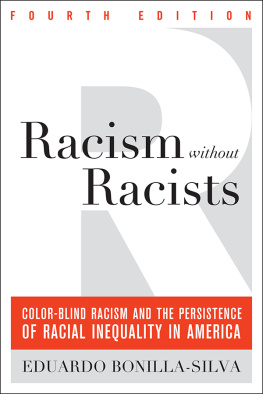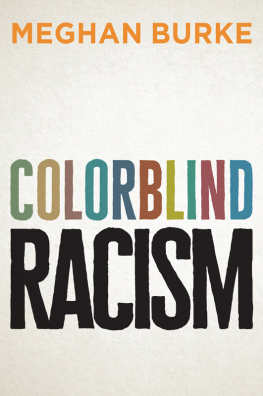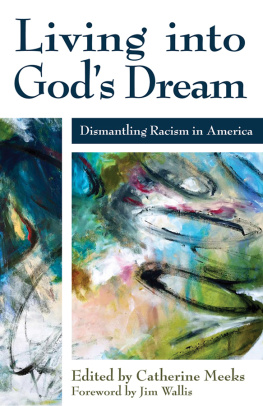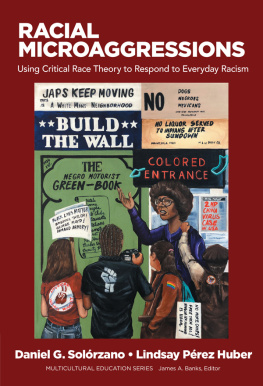Racism without Racists
Racism without Racists
Color-Blind Racism and the Persistence of Racial Inequality in America
Fourth Edition
Eduardo Bonilla-Silva
Rowman & Littlefield Publishers, Inc.
Lanham Boulder New York Toronto Plymouth, UK
Published by Rowman & Littlefield Publishers, Inc.
A wholly owned subsidiary of The Rowman & Littlefield Publishing Group, Inc.
4501 Forbes Boulevard, Suite 200, Lanham, Maryland 20706
www.rowman.com
10 Thornbury Road, Plymouth PL6 7PP, United Kingdom
Copyright 2014 by Rowman & Littlefield Publishers, Inc.
ONE MORE TIME
Words and Music by SAM COOKE
1962 (Renewed) ABKCO MUSIC, INC.
All Rights Reserved
Used by Permission of ALFRED MUSIC
All rights reserved. No part of this book may be reproduced in any form or by any electronic or mechanical means, including information storage and retrieval systems, without written permission from the publisher, except by a reviewer who may quote passages in a review.
British Library Cataloguing in Publication Information Available
Library of Congress Cataloging-in-Publication Data
Bonilla-Silva, Eduardo, 1962
Racism without racists : color-blind racism and the persistence of racial inequality in America / Eduardo Bonilla-Silva.Fourth edition.
pages cm
Includes bibliographical references and index.
ISBN 978-1-4422-2054-6 (cloth : alk. paper)ISBN 978-1-4422-2055-3 (pbk. : alk. paper)ISBN 978-1-4422-2056-0 (electronic) 1. MinoritiesUnited StatesSocial conditions. 2. MinoritiesUnited StatesEconomic conditions. 3. RacismUnited States. 4. United StatesRace relations. I. Title.
E184.A1B597 2014
305.800973dc23 2013015714
 The paper used in this publication meets the minimum requirements of American National Standard for Information SciencesPermanence of Paper for Printed Library Materials, ANSI/NISO Z39.48-1992.
The paper used in this publication meets the minimum requirements of American National Standard for Information SciencesPermanence of Paper for Printed Library Materials, ANSI/NISO Z39.48-1992.
Printed in the United States of America
I do not have many real friends. I have plenty of acquaintances, but not many people that I truly trust. In my friendship kingdom, very few are allowed in. To them I dedicate this edition. Their names are irrelevant in mass communications like this one, but they all know who they are. These are the people that are indispensable to me. They all have been there for me during tough times such as the death of my brother, during a recent operation, when I have needed advice on work or life issues, or during the many times I have made mistakes in my life. My blood family is peculiar, but this, my other family, bonded by love and solidarity, counts as much as my real family. At the helm of my nonblood family is the only person who loves me for real and all the way, my wife, Mary Hovsepian. Countless people question why we are still together. The answer is that my Mary is a truly exceptional person. We have been together twenty-five years and, honestly, it feels like today is still 1988. Mary, I am not the best, but you and I together add to more than two. Thanks for loving me despite my silliness and volatility. I will try to be better to you in the next twenty-five years.
Contents
Acknowledgments
The last words my mother told me before I left Puerto Rico in 1984 were: Son, in the United States you need to walk and behave like a king. She also told me something to the effect that no matter what the gringos said about me, I always had to remember that I was as good if not better than them. At the time, I did not understand her advice. Over twenty years later, I fully understand her enormous wisdom. In this country, racial others of dark complexion are always viewed as incapable of doing much; we are regarded and treated as secondary actors only good for doing beds in hotels or working in fast-food restaurants. Therefore, my mothers advice (walk and behave like a king) helped me develop the much-needed emotional coraza (shield) to repel all the racial nonsense of gringolandia (Frida Kahlo was so right about this country!). Thanks Mami!
This coraza has come in handy in my sociological career, because at every step of the way, I have encountered people who have tried to block my path one way or another. Fortunately, I have also encountered along the way many people who have helped me in this, my second country. And, in truth, my experience with good and generous people has outweighed that with the bad ones. Many of the former have seen me without my coraza and know the real me. At my alma mater (UWMadison), professors such as Pamela Oliver, Russell Middleton, and Erik Wright were exceedingly generous with me. So were professors Sam Cohn (now my colleague at Texas A&M), Gay Seidman, and Denis OHearn, all of whom I served with as a teaching assistant. Wright and Oliver were even kind enough to read and send me feedback on a working paper I wrote two years after leaving Wisconsin. The paper appeared in 1997 in ASR with the title Rethinking Racism: Toward a Structural Interpretation. But the most important sociological force that affected me at Wisconsin was my adviser, Professor Charles Camic. He was the perfect adviser for me. Professor Camic was knowledgeable, kind, savvy, and had an uncanny understanding of the business side of sociology. Then and now, whenever I have a big (sociological) issue at hand, he is one of the first people I consult. Thanks, Chas, for being there for me. I hope I am able to repay you in some way.
At Michigan there were a number of colleagues who were very nice to me: Mark Chesler, Julia Adams, Howard Kimeldorf, Muge Gocek, Silvia Pedraza, Jim House, David Williams, and a few others. However, the people who helped me navigate that peculiar institution were professors Donald Deskins Jr., Alford Young II, and Carla OConnor. These three colleagues were more than my colleagues: they were my friends and allies. Thanks Don, Al, and Carla! I hope the sociological gods allow us to work together one more time before our time expires.
At my sociological house, Texas A&M University, almost everyone has helped me. In my first year there, I received more feedback and love than I did at Michigan in five years! Thus, I thank the entire sociology department at A&M for providing me almost unconditional support. I hope I have not disappointed yall. Also deserving special mention are two former sociological Aggies, professors Benigno Aguirre (University of Delaware) and John Boies of the U.S. Census Bureau. They both enriched my sociological and nonsociological life. I miss having lunch with John and coffee with Benigno! Last but not least at A&M, my three outstanding graduate students, David G. Embrick (whom I owe many, many, many thanks for his steadfast loyalty and hard work), Paul Ketchum, and Karen Glover, helped me with some of the data and analysis and have supported me beyond the call of duty. Thanks for all your help and support, and I hope to read your own books soon!
Other people who have loved me de gratis in sociological Ameri kkk a are Joe R. Feagin, Hernn Vera, Judith Blau, Tukufu Zuberi, Hayward Horton, Ashley Doane, Gianpaolo Baiocchi, Joane Nagel, Margaret Andersen, Cedric Herring, Abel Valenzuela, Rogelio Saenz, Tyrone A. Forman, Amanda E. Lewis, Walter Allen, Eddie Telles, Michael O. Emerson, Paul Wong, Jose Padin, Veronica Dujon, Carla Goar, William Darity, Geoffrey Ward, Nadia Kim, Ramiro Martinez, Tom Guglielmo, Moon-Kie Jung, and Larry Bobo, among others. I also wish to thank the folks of the Association of Black Sociologists and the ASA Section on Racial and Ethnic Minorities for supporting me over the past five years.
The data for this book were gathered while I was a professor at Michigan. I thank all the people involved with the 1997 Survey of Social Attitudes of College Students (Amanda, Tyrone, and all the undergraduate students who helped me out!) and the 1998 Detroit-Area Study (DAS). The 1997 survey was done partly with funding from the ASA-NSF (National Science Foundation) Fund for the Advancement of the Discipline. The 1998 DAS was done with Michigan funds. However, I want to thank Jim House and Earl Lewis for funding the interview component for the 1998 DAS. Without those interviews, the 1998 DAS would have been just another run-of-the-mill survey on racial attitudes.








 The paper used in this publication meets the minimum requirements of American National Standard for Information SciencesPermanence of Paper for Printed Library Materials, ANSI/NISO Z39.48-1992.
The paper used in this publication meets the minimum requirements of American National Standard for Information SciencesPermanence of Paper for Printed Library Materials, ANSI/NISO Z39.48-1992.